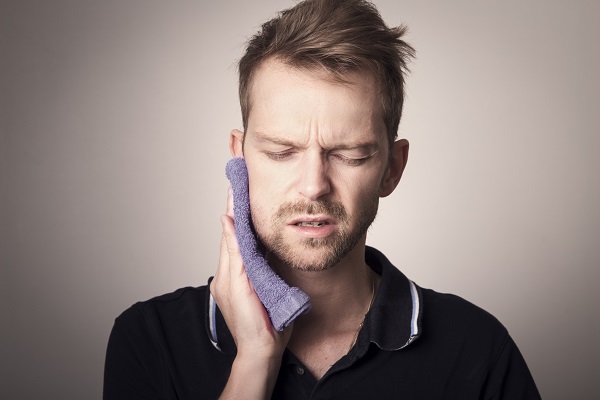When your wisdom teeth fail to fully come out, it can cause crowding and other problems. This may result in a wisdom teeth extraction. Generally, patients will get this procedure, if they need it, between the ages of 17 and 25. Below, we outline what you can expect after a wisdom tooth extraction. We provide a wisdom teeth removal recovery timeline, the type and causes of postoperative pain, how you can alleviate it, and how to care for your mouth after the extraction.
Wisdom Teeth Removal Pain
Each patient has a different experience with wisdom teeth removal pain. However, the typical pain following wisdom tooth removal is more accurately described as discomfort. Patients can also expect some swelling following the surgery.
The pain and swelling result from impacts upon the job and the tooth being extracted. Thanks to the local anesthesia or numbing agents for the surgery, you will not feel any of this. However, the nerves of your jaw and gums will be impacted. When the numbness goes away, this is where you feel the effects.
Removal of all four teeth at one time may intensify the pain. For some patients, such a removal is necessary or advised by the dentist. Also, you might expect more severe discomfort should you need an emergency tooth extraction.

What Is the Typical Wisdom Teeth Removal Recovery Timeline?
As a rule of thumb, the wisdom teeth removal recovery timeline should last approximately two weeks.
In the first 24 hours following the procedure, blood clots develop. These have the purpose of sealing the opening and healing the wound. The scarring during this process might contribute to the irritation if not left alone.
Swelling in the mouth and cheeks begins to subside noticeably after two to three days. You likely will have a follow-up dental appointment after one week to remove the stitches. Within ten days after the extraction, any stiffness and soreness in the jaw likely will disappear. It might take up to two weeks to eliminate any remaining bruising and fully recover.
What Should I Avoid Immediately After the Surgery?
Allowing the surgical area to heal and keeping out infecting agents represent the primary goals of the aftercare process. In other words, you don’t want to undermine the effect of the blood clotting or reopen the wound.
During the initial 24 hours after the surgery, do not brush or floss your teeth. Avoid rinsing or spitting in this time. These actions can dislodge the blood clot. Afterward, you can brush, but do so gently and use a soft brush.
Remember that you have been sedated during the surgery. Depending upon the method of anesthesia or numbing, you may have some lingering effects in the hours immediately following the extraction. To play it safe, consider having someone take you to and from the surgery. You might wish to give it a day before you operate machinery. Refrain from it if you still take prescriptions for the pain.
What Foods Can I Eat After Wisdom Teeth Removal?
Wisdom teeth removal aftercare also means prudently deciding what to eat during recovery. For the sake of reducing pain and dislodging blood clots, opt for soft items. These may include pasta, ice cream, cottage cheese, rice, and soup.

Steaks, chewy or hard candy, toasted bread, and other hard foods should perhaps wait while you recover. The candy comes with sugar, which might lead to infection if not promptly removed.
Eating foods with seeds, such as watermelon, pepper or sunflower seeds, shouldn’t be consumed, since the seeds can become stuck in the hole left by the extraction. Similarly, nuts can also become stuck in these areas. When you leave particles in oral openings, you run the risk of infection and undermining the extraction.
For beverages, stick primarily to water. Sugary drinks, such as soda, sweet tea, and juices, introduce material that can promote tooth decay or infection if not removed. Hot coffee or other hot beverages can result in extra sensitivity, add to your discomfort, and potentially undo blood clots.
Wisdom Teeth Removal Pain Remedies
If the pain is not too severe, Tylenol or ibuprofen may provide some relief. However, over the counter pain relievers do not alleviate the swelling. Thus, you might be prescribed certain anti-inflammatory medications. For significant pain, the dentist may prescribe a narcotic. Avoid driving or operating machines and other equipment when you are under the effects of the medication.
Some home remedies can also counteract pain, swelling, and the risk of infection. These include:
- Ice pack. Make sure you do not directly apply ice to your face because this might cause ice burn. Use a towel or other padding between the face and the ice.
- Mildly warm black tea bags. Warm the tea bag and apply it to your face near the area of the extraction. Tea can lower swelling and pain.
- Warm salt water. Pour a few tablespoons of salt into hot water. Once the salt dissolves and the water becomes warm, rinse it in your mouth.
- Mouthwash. Choose antiseptic mouthwash to combat bacteria and other sources of potential infection.
- Cucumbers. Chilled — not frozen — cucumbers afford pain relief. You want to avoid freezing them to prevent ice burn on your face.
Wisdom Teeth Extraction Complications
Wisdom tooth extraction complications are not very common. However, you should be aware of them. Seek dental attention if they arise.
Dry socket happens when the wound does not heal effectively. While this happens in five to ten percent of cases, smoking can increase the chances. By itself, dry socket is not an infection. However, infection based complications do arise in approximately one percent of the patients. Proper care of the mouth, which includes soft brushing, flossing, and avoiding sugary foods, can help lower your risk.
Conclusion
For most patients, wisdom teeth extraction comes with discomfort that generally lasts a short time. The wisdom teeth removal recovery timeline for most will last no more than two weeks. Observe these tips for teeth extraction aftercare and take the advice of your dentist to further avoid a rough recovery. We invite you to share your thoughts and any wisdom teeth pain remedies you have tried down below. What was your wisdom teeth removal recovery timeline?

Leave a Comment